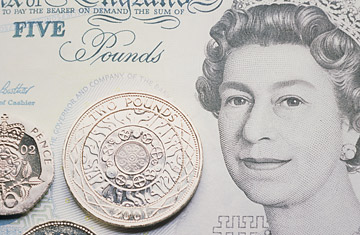
British bank note and coins
China's premier made some pointed remarks about the U.S. economy and its appetite for increasing the national deficit in order to save the American way of life. The fallout from his observations is a new concern in the public's mind about whether the Treasury can make the payments on its bonds.
China holds more U.S. debt than any other entity either private or sovereign. Whether the communist government is really worried about the value of the U.S. paper it holds or is just making a public insult about the flaws in American capitalism may never be known. What is known is that the financial markets have enough concern about Treasuries now to support a market for insuring U.S. debt in the event that the government cannot meet its obligations in the future. (See pictures of the global financial crisis.)
The concern about rising national debt in countries without the American tax base and huge GDP has increased exponentially. It is even becoming an issue for large and more stable countries including the U.K. The British government may put some of its most valuable and well-known assets up for sale in order to prevent further increases in the national deficit. (See pictures of the snow crippling London.)
According to The Times of London, "The government is pressing ahead with plans to sell a string of state-owned organizations as part of a privatization drive to add £35 billion to the dwindling public purse." Among the treasures being sold are the Royal Mint and the national mapping agency.
In almost every sense, it is a tragedy that the British government would have to part with such historically important assets. In another, it the strongest testimonial yet about how severe the deficit problems have become even in the wealthiest nations.
While there have not been any proposals to sell assets held by the U.S. government, it may come to that if tax receipts are undermined by the recession and spending continues to rise in order to bail out financial institutions and add jobs to the economy.
Fortunately, America has more to sell than the U.K. Yellowstone was established as a national park in 1982. It has more than 2.2 million acres of land, making it larger than Rhode Island and Delaware combined. It is a logger's dream. International Paper recently announced that it would sell 143,000 acres of its land for $275 million. At that rate, Yellowstone should be worth over $4 billion. (Read a TIME story on Yellowstone.)
The National Park System manages bout 83 million acres. Not all of that land is worth as much as Yellowstone, but combining oil drilling, mining, logging, and tourism revenue, it would be conservative to say that the sale of all that land could cover 20% of the costs of the new stimulus package.
Selling the parks does not bring in enough capital to close the gap in a deficit that will be well over $1 trillion this year, so the list of items that the U.S. would have to sell or lease needs to be a great deal longer. It is not well-know that the Minerals Management Service of the Interior Department is the second largest source of income to the U.S. government. Last year, it was revealed that employees of this office were routinely taking money and having sexual relationships with oil company executives. According to The Wall Street Journal, government employees were also given illegal recreational drugs. There is really nothing wrong with any of that if it does not cost the Treasury any money, but apparently it has. Leases with oil companies which pay royalties to the U.S. government may have been affected. The total amount of money that comes in from the Mineral Management System each year is about $11 billion. If the sex addicts are thrown out of the service, it could be worth a few billion more. And, if Congress and the Administration would do everything that they can to give oil companies permits for off-shore drilling in areas which have recently been approved for this purpose, it would certainly add billions of dollars in additional money to the annual amounts that the Interior Department sends to the Treasury. Exxon Mobil says that if drilling can begin in all of these areas, it would create 76,000 jobs.
The sum total of the value of all of the office buildings, monuments, military hardware, and laboratories that the federal government owns must stretch well into the hundreds of billions of dollars. What billionaire would not want to own the U.S. embassy in London? (Read a TIME story on the U.S. embassy.)
The U.S. has the opportunity to run a substantial budget deficit and to cut taxes by an action as simple as selling the Washington Monument and a few other assets which have little value to taxpayers but a great deal of value to private enterprise. Admission to the Washington Monument is free. Who does that serve during a budget crisis?
— Douglas A. McIntyre
See pictures of the global financial crisis.
For constant business updates, go to 24/7wallst.com.
